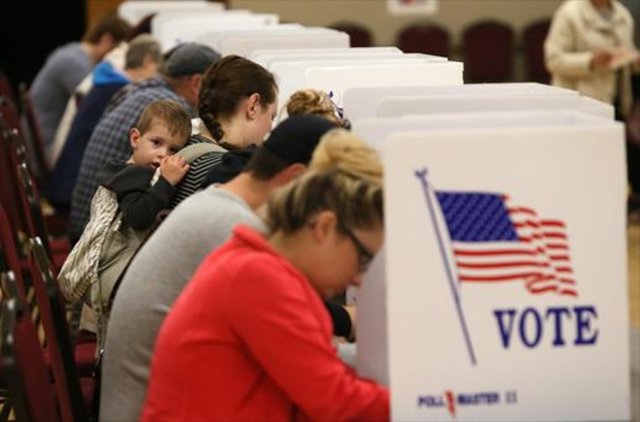US vote count: What do we know so far?

The Green Party initiative to try to recount votes in three states - Wisconsin, Pennsylvania and Michigan - by the suspicion of manipulation has opened a scenario full of questions. For the moment, neither the Democratic Party nor Hillary Clinton herself strongly supports an initiative that calls into question the victory of Donald Trump, who has responded by denouncing millions of fraudulent votes in favor of his rival.
WHY SHOULD I MAKE A COUNT?
In the US, three-quarters of voters exercise their right by marking their favorite candidate on a ballot that is then read with an optical scanner. However, several states have eliminated that system and have replaced it with machines where voters mark their candidate on a touchscreen. That method has detractors, who warn that electronic votes are not recorded on paper and machines can be pirated. Those are the votes that are in question.
A group of computer experts and law enforcement lawyers have called for a vote count in the states of Wisconsin, Pennsylvania and Michigan. Among those experts are attorney John Bonifaz and J. Alex Halderman, director of the Center for Computer Security and Society at the University of Michigan. The experts justify their request for a recount stating that they have found a pattern that may indicate a computer hacking of the counting devices of votes. Thus, they indicate that in the districts where voting in those machines of tactile voting, Clinton obtained 7% less of votes than in those in which were used ballots. However, they only have that pattern, not evidence that proves piracy.
According to that pattern, in Wisconsin, Clinton could have been deprived of 30,000 votes. Considering that he lost that state by 27,000 votes, experts consider that, if real, that manipulation was key
WHAT STATES ARE BELOW?
The vote counting campaign affects Wisconsin, Michigan and Pennsylvania, three states in which Trump won a small advantage. So the tycoon won in Wisconsin by 27,257 votes (only a 0.7% advantage), Pennsylvania by 70,010 (1.2%) and Michigan by only 10,704 votes (0.3%).
CAN THE VICTORY OF TRUMP BE IN DANGER?
On paper, that count could jeopardize Trump's victory. Who wins in Michigan takes 10 voters; In Pennsylvania, 20; And in Wisconsin, 16. Altogether, these three states generate 46 voters.
If the count was made in those three states and in all three it was won Clinton, the final result of the elections would change totally. Thus, Trump, who has obtained 306 electoral votes, would be left with 260 and would not have the necessary majority to be president. Instead, Clinton would move from 232 to 278 and would be the winner.
Another possibility is that the count is not finished by December 19 - and it is quite likely that if allowed, do not give time to do so - which is when the Electoral College meets. Federal law states that if a state count is ordered and not completed, that state can not elect voters, so Trump could run out of those 46 voters and neither he nor Clinton would have won the election, Since none would reach the figure of 270.
¿ES POSIBLE UN VUELCO EN LOS RESULTADOS?
Parece poco probable que el recuento se lleve a cabo en los tres estados. De hecho, ni siquiera está claro de que se acabe realizando en Wisconsin, el único donde se ha solicitado formalmente. Desde la Casa Blanca se ha asegurado que no hay indicios de que el proceso de voto haya sido manipulado en ningún estado.
Además, ni el Partido Demócrata ni tan siquiera el equipo de campaña de Clinton, aunque a última hora se ha sumado a la iniciativa en Wisconsin, dan señales de estar a favor de esa iniciativa. La razón es que consideran que cuestionar el resultado electoral puede dañar gravemente la credibilidad del sistema electoral en EEUU. No quieren que se les acuse de actuar como Trump, que antes de las elecciones no dejó claro si aceptaría su derrota. Además, Clinton ya ha reconocido su derrota públicamente.
¿EN QUÉ FASE ESTÁ EL PROCESO?
El Partido Verde, que lidera la campaña para el recuento de votos, ha logrado los fondos para costearlo en Wisconsin. La petición formal de recuento llegó apenas hora y media antes de que acabara el plazo, pero fue admitida. Ahora, la autoridad electoral de ese estado ha de anunciar si acepta o no que se vuelvan a contar los votos. Además, Trump tiene siete días para recurrir esa solicitud de recuento. Si finalmente se acepta, se habrá de realizar el recuento manual de tres millones de papeletas y el resultado definitivo habrá de anunciarse antes del 13 de diciembre.
En Michigan, el plazo para solicitar el recuento acaba el 30 de noviembre. En Pensilvania, el plazo ya ha pasado, aunque se puede recurrir a los tribunales para hacerlo.
Y en caso de que finalmente se emprendan los recuentos, habrá que plantearse cómo volver a contar unos votos de los que no hay huella en papel y que están en máquinas presuntamente pirateadas. En el caso de Pensilvania, prácticamente el 100%.